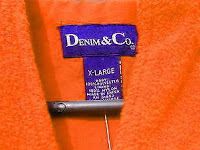A divided Board panel affirmed two refusals to register the standard character mark DENIM & CO. for various clothing items made of materials other than denim, on the grounds of deceptiveness under Section 2(a) and, alternatively, deceptive misdescriptiveness under Section 2(e)(1). In re QVC, Inc., Serial No. 86670074 (January 21, 2020) [not precedential] (Majority opinion by Judge Cynthia C. Lynch; dissent by Judge Marc A. Bergsman).

Deceptiveness: A mark is deceptive under Section 2(a) if:
- it consists of or comprises a term that misdescribes the character, quality, function, composition, or use of the goods;
- prospective purchasers are likely to believe that the misdescription actually describes the goods; and
- the misdescription is likely to affect the purchasing decision of a significant or substantial portion of relevant consumers.
The panel majority (Judge Lynch and Judge David Mermelstein) found that DENIM & CO. misdescribes the goods. Applicant QVC contended that DENIM refers not to the material content of the goods but to a "comfortable, casual and relaxed lifestyle." The Board didn't buy it. It found that, considering the mark as a whole, DENIM refers to the fabric. QVC's evidence that it refers to a lifestyle was "minimal and unpersuasive," and was "dwarfed by overwhelming evidence" of use of DENIM to refer to the fabric from which denim clothing is made.
QVC did not argue that the addition of "& CO." to DENIM changed the connotation of the mark, but since the dissenting opinion made that point, the panel majority addressed it. It found that CO. is an abbreviation for "company," and that the mark "gives the impression of a business enterprise connected with denim fabric."
The panel majority next found that the misrepresentation was believable. QVC contended that the following limitation in the identification of goods prevents consumers from believing the misdescription:
... sold through interactive television and interactive online media wherein the clothing products offered for sale are modeled and whereby detailed information regarding such clothing products is provided including information as to the fabrics and materials from which such clothing products are made.
The majority, however, found this language ineffective to foreclose deceptiveness. The definition of "interactive" could include any television show or website that allows a consumer to order merchandise. The fact that the clothing is "modeled" does not prevent a consumer from believing the misdescription. Similar arguments about fabric content disclosure have been made and rejected in prior cases. Even as to interactive channels of trade, consumers may focus on the DENIM & CO. mark without paying attention to the fabric content disclosure. Moreover, evidence of QVC's advertising showed no fabric content disclosures, or disclosures that were ambiguous.
As to the third prong of the test, consumers desire denim clothing because it is strong and durable, easy to clean, and comfortable. QVC touts some of the advantages of denim at its website. The Board was therefore convinced that "whether clothing is denim is material to the purchasing decision of a significant portion of the relevant consumers."
All three prongs of the Section 2(a) test having been met, the Board affirmed the deceptiveness refusal.
Deceptive Misdescriptiveness: In the interest of completeness, the Board also considered the Section 2(e)(1) refusal, despite the fact that its Section 2(a) deceptiveness finding is an absolute bar to registration. Since the two prongs of the Section 2(e)(1) test are the same as the first two prongs of the Section 2(a) test, the Board found the mark to be deceptively misdescriptive, and it therefore affirmed the alternative requirement of a disclaimer of DENIM.
Dissenting Opinion: Judge Bergsman maintained that DENIM & CO. has a meaning and engenders a commercial impression that is not deceptive: denim and other materials. Furthermore, the majority failed to give proper weight to the explanatory information in the identification of goods, which makes it clear that the clothing products are not made of denim. The apparel includes "detailed information regarding ... the fabrics and materials from which such clothing products are made."
Judge Bergsman opined that, based on QVC's long and successful use of the mark, consumers are likely to regard DENIM & CO. as "identifying all clothing Applicant sells and not [likely to] believe the mark refers only to clothing made of denim."
Read comments and post your comment here.
The content of this article is intended to provide a general guide to the subject matter. Specialist advice should be sought about your specific circumstances.
